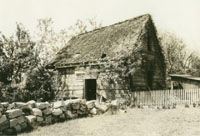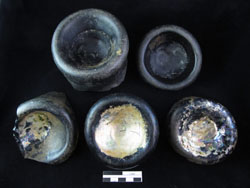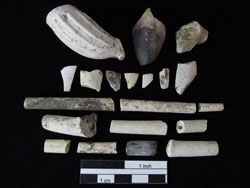
|
| Vol. 20 No. 4 |
May 3, 2012 |
|
|
WSSI Archeologists First to Excavate 18th Century
Tavern in Loudoun County
|
Archeologists from Wetland Studies and Solutions, Inc. (WSSI) recently completed a Phase III archeological data recovery on the Kincora development property in eastern Loudoun County. This project proved unique as it was discovered that the site was home to an 18th century ordinary, which was a term often used to describe taverns, inns, and public houses during the 1700's1.
Although not uncommon on the 18th century landscape, very few ordinaries from this time period have been excavated in Virginia and only one had been previously recorded in Loudoun County. The Kincora site is the only 18th century ordinary site in Loudoun County that has been excavated and subjected to this intensive level of analysis. |
Identifying an Ordinary
Ordinaries were important elements in the social and economic landscape of early America. These establishments provided a convenient location for overland travelers to find meals and overnight accommodations. Additionally, locals gathered at ordinaries to conduct business, socialize, gamble, dine, smoke and drink. In the 18th century, drinking was likely the most popular of tavern recreations and alcohol was consumed often and in large quantities (some things are timeless!). |
|

The ordinary discovered by WSSI may have resembled this building, the circa 1771 Wiley's Tavern in Halifax County, Virginia.
|
|
Glass bottles were a key to interpretation, as glass was rare and an expensive commodity in colonial America. Only small quantities of bottle glass are usually recovered from archeological excavations of period dwelling and farmstead sites in the region. In comparison, the Kincora site yielded large quantities of bottle glass and a greater number of tobacco pipes than expected, indicating that this site was a tavern or ordinary where people gathered to smoke tobacco and consume alcohol.
The data recovery excavations at the Kincora site also included the investigation of multiple historic cultural features at the site, including a formal cellar, a root cellar, a drainage trench and several postholes. Based on these features and the artifacts, WSSI archeologists were able to identify the locations of three buildings on the site - the ordinary, a detached kitchen, and stables.
|
 |
 |
| The artifacts recovered from the cellar of the ordinary included the bases from free blown wine and beer bottles dating to the 18th century. |
Excavations at the Kincora site also resulted in the recovery of numerous kaolin or ball clay pipe stems and several pipe bowls. |
|
Contributions to the Field of Archeology
The Kincora site afforded an exceptional and challenging opportunity to study a rare site type in Loudoun County. WSSI's research has contributed to our understanding of rural and urban taverns of the 18th century and may assist the overall archeological community in identifying ordinary (tavern) sites throughout the region.
For more information on this project or WSSI's cultural resource service offerings, please contact Kim Snyder or Boyd Sipe.
|
1 Hunter Dickinson Farish (ed.), Journal and Letters of Philip Vickers Fithian, 1773-1774: A Plantation Tutor of the Old Dominion (Charlottesville: University Press of Virginia, 1968), 177.
|
|
|
|
|
 |
|
|